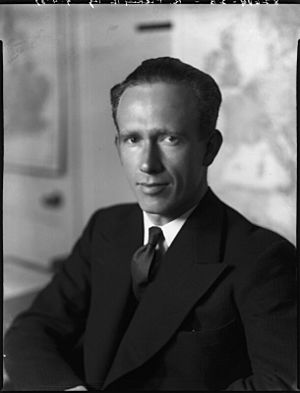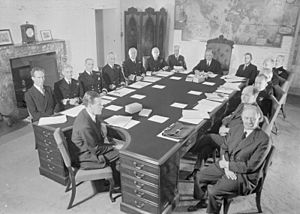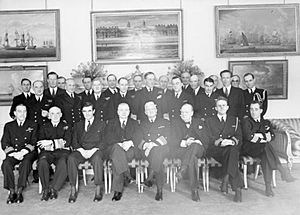Richard Pilkington (politician, born 1908) facts for kids
Quick facts for kids
Sir Richard Pilkington
|
|
|---|---|
 |
|
| Member of Parliament for Widnes |
|
| In office 14 November 1935 – 15 June 1945 |
|
| Preceded by | Roland Robinson |
| Succeeded by | Christopher Nyholm Shawcross |
| Member of Parliament for Poole |
|
| In office 25 October 1951 – 25 September 1964 |
|
| Preceded by | Mervyn Wheatley |
| Succeeded by | Oscar Murton |
| Personal details | |
| Born | 10 May 1908 St Helens, Lancashire, UK |
| Died | 9 December 1976 (aged 68) |
| Political party | Conservative |
| Spouses | Rosemary Kidwell, née Russell-Roberts |
| Children | Three daughters |
| Parents | Arthur Richard Pilkington and Marjorie Cope |
| Alma mater | Christ Church, Oxford |
Sir Richard Antony Pilkington (born May 10, 1908 – died December 9, 1976) was a British politician and soldier. He was a member of the Conservative Party and served in the British Army.
Early Life and Education
Richard Pilkington was born in St Helens, England. His father, Arthur Pilkington, was in charge of the famous Pilkington glass company. His mother, Marjorie Cope, was the daughter of a well-known painter.
Richard went to two excellent schools: Charterhouse and Christ Church at the Oxford University. After finishing his studies, he traveled and worked in North America for two years, from 1928 to 1930.
In 1930, he joined the Coldstream Guards, a very old and respected part of the British Army. He served as a soldier in countries like Sudan and Egypt.
Military and Political Career
In 1935, Richard decided to leave the army to become a politician. He was elected as a Member of Parliament (MP) for Widnes in Lancashire. An MP is someone who represents their local area in the UK Parliament, helping to make laws for the country. He also worked closely with another important politician named Oliver Stanley.
When Second World War started, Richard rejoined the Army. He went to France with the British Expeditionary Force, which was a group of British soldiers. He was very brave during the war. He was given the Military Cross award after helping to bring some of the last groups of soldiers back from Dunkirk in 1940.
In 1942, he left the Army again. He became a Civil Lord of the Admiralty, which meant he helped manage the British Navy. In this role, he traveled on important naval missions to India, Ceylon (now Sri Lanka), and Burma (now Myanmar).
After the war, he lost his MP seat in 1945 and again in 1950. However, in 1951, he was elected as the MP for Poole in Dorset. He kept this job until 1964, when he retired from politics. He retired because he had a car accident and started to develop Parkinson's disease, a condition that affects movement.
Richard Pilkington passed away in 1976 at the age of 68 due to Parkinson's disease.
Personal Life
Richard Pilkington was known for his interesting hobby: collecting cars. All of his cars were red! His nephew, Sir Antony Pilkington, also shared this passion for cars.
 | John T. Biggers |
 | Thomas Blackshear |
 | Mark Bradford |
 | Beverly Buchanan |



